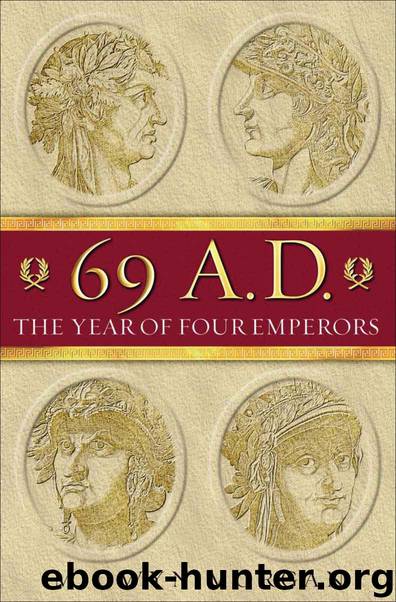69 AD: The Year of Four Emperors by Morgan Gwyn

Author:Morgan, Gwyn [Morgan, Gwyn]
Language: eng
Format: azw3, epub
Publisher: Oxford University Press
Published: 2005-11-30T16:00:00+00:00
8
The Beginning of the End: Vespasian through August 69
To understand the campaign by the Balkan legions that unseated Vitellius in late December 69, we must deal first with the man in whose name—if not always with whose blessing—they undertook their offensive. Discontented as these legions were, apparently from the moment Otho committed suicide in mid-April, they had no cause to embrace until Vespasian was proclaimed emperor and invited them to take up arms in his behalf. It was as well that they did so. For of the four men who became emperors in 68/69, Vespasian must have seemed to contemporaries as well as to posterity the one whose bid for power was the least likely to succeed, by reason of his birth, his age, and his career to date. Hence Tacitus’ frequent references to “the luck of the Flavians,” the many stories Suetonius retails of signs portending Vespasian’s elevation to the throne, and—for that matter—his insistence that Vespasian and his two sons, Titus and Domitian, believed or came to believe firmly in the workings of Fate.
To reconstruct Vespasian’s activities we must rely on a relatively brief life by Suetonius, a comprehensive if eulogistic account of his campaigns in Judaea by Josephus, stray details from what remains of Dio’s history, and above all, the information Tacitus chooses to provide. As usual, Tacitus is the most important of our sources, but—also as usual—he provides the information in ways that suit his purposes much better than they do ours. The bulk of the material he serves up in three segments, each set at more or less the appropriate chronological point in his overall account, the first in the survey of the empire’s situation in January 69; the second where Otho and Vitellius have been brought on stage and the possibility of Vespasian’s taking a hand in the game is raised; and the third where Vitellius has not yet reached Rome, but has already given what Tacitus presents as clear evidence that he is unfit to rule. In none of these segments, however, does Tacitus favor the emperor who gave him his own start in public life. Though he declares Vespasian the first man to be improved by becoming emperor, a relative judgment anyway, one of his aims throughout is to debunk the idea that Vespasian had undertaken his revolt to save the empire from Vitellius. Though the new emperor fostered this claim assiduously, chronology alone—as Tacitus recognized—proved that it was never more than a pretext.
The most notable feature of Vespasian’s early career, and of his family as a whole, was its lack of distinction. Suetonius apologizes for this in his very first paragraph, maintaining that this obscurity was nothing of which Rome needed to be ashamed when Vespasian’s own achievements compensated so fully for it. Yet the need to apologize shows how reluctant Romans still were to embrace the idea that ability could be found in a man without a pedigree. The first member of the family to make anything of himself, says Suetonius, was Titus Flavius Petro, Vespasian’s paternal grandfather.
Download
69 AD: The Year of Four Emperors by Morgan Gwyn.epub
This site does not store any files on its server. We only index and link to content provided by other sites. Please contact the content providers to delete copyright contents if any and email us, we'll remove relevant links or contents immediately.
The Daily Stoic by Holiday Ryan & Hanselman Stephen(3299)
The Fate of Rome: Climate, Disease, and the End of an Empire (The Princeton History of the Ancient World) by Kyle Harper(3055)
People of the Earth: An Introduction to World Prehistory by Dr. Brian Fagan & Nadia Durrani(2727)
Ancient Worlds by Michael Scott(2682)
Babylon's Ark by Lawrence Anthony(2671)
The Daily Stoic by Ryan Holiday & Stephen Hanselman(2569)
Foreign Devils on the Silk Road: The Search for the Lost Treasures of Central Asia by Peter Hopkirk(2455)
India's Ancient Past by R.S. Sharma(2450)
MOSES THE EGYPTIAN by Jan Assmann(2411)
The Complete Dead Sea Scrolls in English (7th Edition) (Penguin Classics) by Geza Vermes(2276)
The Earth Chronicles Handbook by Zecharia Sitchin(2226)
Lost Technologies of Ancient Egypt by Christopher Dunn(2223)
24 Hours in Ancient Rome by Philip Matyszak(2078)
Alexander the Great by Philip Freeman(2064)
Aztec by Gary Jennings(2021)
The Nine Waves of Creation by Carl Johan Calleman(1914)
Curse Tablets and Binding Spells from the Ancient World by Gager John G.;(1860)
Before Atlantis by Frank Joseph(1849)
Earthmare: The Lost Book of Wars by Cergat(1822)
